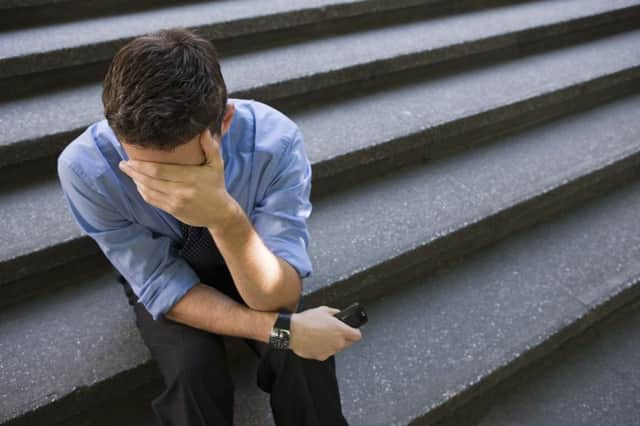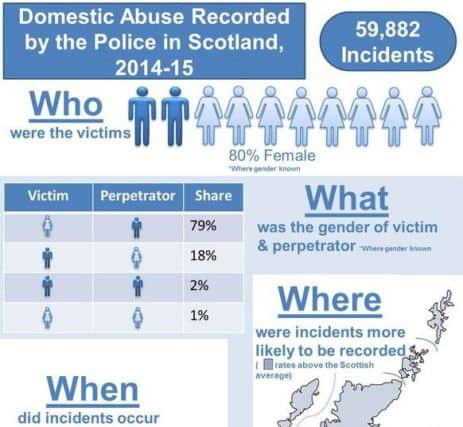Domestic abuse in Scotland: Number of male victims double in 10 years


New figures, released today by the Scottish Government, show that where gender was recorded, the proportion of domestic abuse incidents with a male victim and a female perpetrator has increased to 20 per cent in 2014-15 from 12 per cent in 2005-06.
Domestic abuse against men doubled between 2005/06 and 2012/13 - from around one in ten to one in five (20 per cent).
Advertisement
Hide AdAdvertisement
Hide AdThe report reveals that the total cases of domestic abuse in 2014-15 have increased by 2.5 per cent compared to the previous year.
There were 59,882 incidents of domestic abuse against both sexes in 2014/15, up nearly a third (32 per cent) on 2005/06.
Nick Smithers, National Development Officer for charity. Abused Men in Scotland said: “Police figures provide a bottom line figure which tell us that around 10, 298 men suffered an incident of domestic abuse last year. Other sources such as the Scottish Crime and Justice survey suggest that this is the tip of the iceberg and tell us that there is a large proportion of cases which go unreported.
“The survey figures suggest that around one in three cases of domestic abuse have a male victim. Certainly most of the men who are supported by AMIS have not reported the abuse to the police.”
Speaking on the issue of male domestic victims, Mr Smithers added: “It remains the case that members of the general public as well as many professionals think of domestic abuse as something that men do to women. This is reflected in campaigns and policy which target women and can inadvertently marginalise male victims.


“The onus really lies on services to look at their policy and practice and ask what they are doing to ensure men can get help. It is gratifying that male victims are becoming recognised but there is a long way to go before services begin to meet the growing need.”
The likelihood of women being victims of domestic abuse is still much higher than that of men, with figures showing that 80 per cent of victims were female in 2014-15 where gender was recorded.
The report also highlights regional inequalities in the number of reported domestic abuse cases. Currently, Dundee City and Glasgow both yield the highest rates of domestic abuse incidents per 100,000 people, with 1,703 and 1,497 cases respectively. In addition, reported domestic abuse cases are more common on weekends, with 37 per cent of all incidents in 2014-15 occurring on a Saturday or Sunday.
Advertisement
Hide AdAdvertisement
Hide AdPolice Scotland’s Disclosure scheme, popularly referred to as “Clare’s Law”, underwent trials in Aberdeen and Ayrshire before being put into place across the country at the start of October this year. The Disclosure Scheme for Domestic Abuse Scotland allows men and women to check the partner of a friend, family member or their own partner’s history with the police if they have concerns over their safety.
Speaking at the official roll-out of the scheme last month, Police Scotland, Deputy Chief Constable Rose Fitzpatrick said: “Domestic abuse affects all our communities.
“Our role is bringing offenders to justice and working with partners to ensure that victims are protected and receive the right support.
“Up to 25 per cent of police time is spent responding to domestic incidents with nearly 60,000 incidents recorded by Police Scotland officers last year.”
It is hoped that the new scheme will contribute to the reduction in domestic abuse incidents across the nation by allowing victims to seek help in a discreet manner.
While these reports investigate domestic abuse cases for all genders, the historical difficulty in overcoming the reluctance of male victims to speak out has been noted and challenged in recent years. A report by Brian Dempsey of the University of Dundee’s School of Law highlights the difficulties in obtaining reliable figures for the number of male victims in Scottish domestic abuse cases by identifying fears of disbelief or ridicule as reasons for not seeking help.